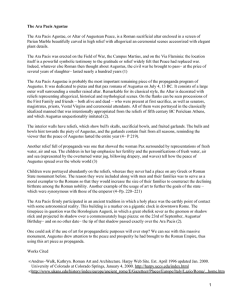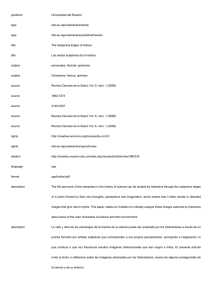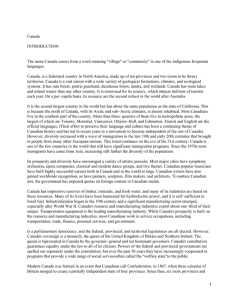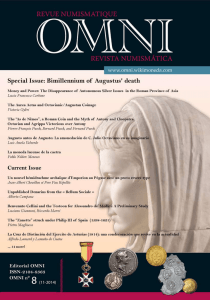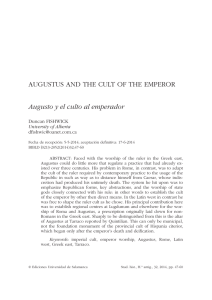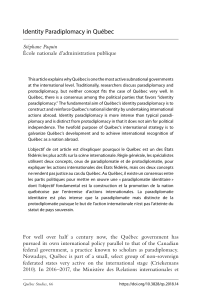Taxation in times of the Principate
Anuncio
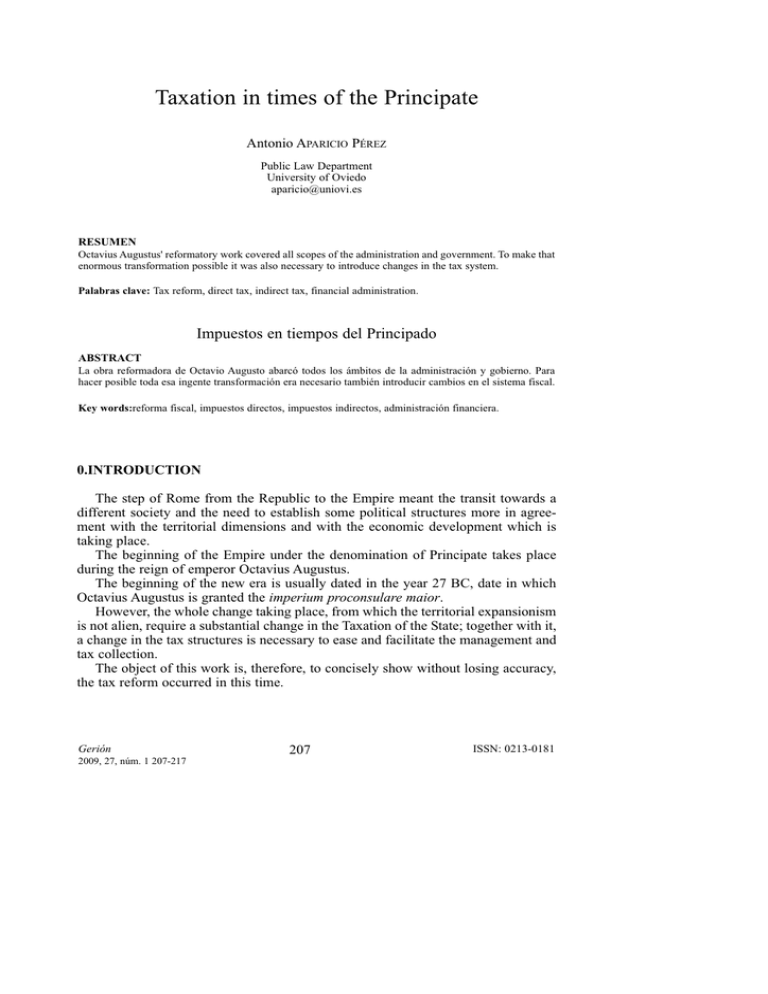
Taxation in times of the Principate Antonio APARICIO PÉREZ Public Law Department University of Oviedo aparicio@uniovi.es RESUMEN Octavius Augustus' reformatory work covered all scopes of the administration and government. To make that enormous transformation possible it was also necessary to introduce changes in the tax system. Palabras clave: Tax reform, direct tax, indirect tax, financial administration. Impuestos en tiempos del Principado ABSTRACT La obra reformadora de Octavio Augusto abarcó todos los ámbitos de la administración y gobierno. Para hacer posible toda esa ingente transformación era necesario también introducir cambios en el sistema fiscal. Key words:reforma fiscal, impuestos directos, impuestos indirectos, administración financiera. 0.INTRODUCTION The step of Rome from the Republic to the Empire meant the transit towards a different society and the need to establish some political structures more in agreement with the territorial dimensions and with the economic development which is taking place. The beginning of the Empire under the denomination of Principate takes place during the reign of emperor Octavius Augustus. The beginning of the new era is usually dated in the year 27 BC, date in which Octavius Augustus is granted the imperium proconsulare maior. However, the whole change taking place, from which the territorial expansionism is not alien, require a substantial change in the Taxation of the State; together with it, a change in the tax structures is necessary to ease and facilitate the management and tax collection. The object of this work is, therefore, to concisely show without losing accuracy, the tax reform occurred in this time. Gerión 2009, 27, núm. 1 207-217 207 ISSN: 0213-0181 A. Aparicio Pérez Taxation in times of the Principate 1.DEVELOPMENT 1.1.The substantive tax reform. As it was conquering and annexing territories, Rome, gave them a different treatment depending on whether or not the annexed villages had the foederatae status, in which case they were only subjected to extraordinary benefits in case of war. The Romans exploited the provinces economically with both ordinary and extraordinary taxes as they were being conquered. The territory then came to be placed in the legal situation of subjected to economic usage right by Rome, as well as undergoing its political sovereignty. The ways of tax imposition over provincial estates during the Principate reflect the distinction collected by Gaius among imperial provinces,or those directly depending of the princeps according to their imperium proconsulare maior and the senatorial provinces which depended directly from the Senate. Apart from this new division we continue to talk of stipendiary and tributary provinces. On the other hand, it has to be remembered that the fundament of the stipendium appears as directly linked to the concept of the fix tax as victoriae praemium ac poena belli (this is, as a reward to victory and compensation to war), whereas the tributum given that it directly taxes the land presupposes a concept of provincial territory as dominium populi romani vel principis (this is, as a property of the Roman people or the prince)1. The arrival of the Principate also means an improvement in the condition of the provinces as they tend to level the administration and government conditions between both types of provinces and the remaining regions in Italy. There are sections of the fiscus Caesaris established in the provinces which constitute separate branches of the empire financial administration and which also contribute to softening the contrast in the financial level among Italy and the Provinces. The lustrum and the decuma or wheat tenth, continue to be collected. Likewise, in this time they continue to deepen in the regularization of the fund duties, establishing the tributum soli liable to be required from pilgrims. Together with these taxes, extraordinary contributions were often required as well as the provision of personal services as the viarium munitio, this is the coactive service to recover roadways. Sometimes, donations in gold known as aurum coronarium were also required to celebrate the victories of Roman generals or the province governor, or else money donations or in kind in favour of the governor, frumentarium honorarium, or consisting on the delivery of wild animals to the circus games for the province or to be sent to Rome, benefits which were known as vectigal aedilicium pecuniae ad ludos. Together with this tax benefits in money or in kind exist a whole series of duties some already existing, established in previous times and others newly implanted. 1 G. I., Luzzato: Voz, "Provincia", Novissimo Digesto Italiano, tomo XIV, Torino,1967, p. 382. 208 Gerión 2009, 27, núm. 1 207-217 A. Aparicio Pérez Taxation in times of the Principate Among the first we must remember the duties on urban estate property, the vicesima libertatis, the portoria and the sacramentum and among the newly created duties are the centesima rerum venalium, the quinta et vicesima venalium mancipiorum, the vicesima hereditatium and the aes uxorium. In the year 43 BC both in Rome as in Italy a duty was established on the urban estate consisting on the payment of a quantity equivalent to a year or six months' rent (real or estimated) depending on if the estate was rented or was the owner's dwelling. The vicesima libertatis was established by the Lex Manlia de vicesima manumissionum in the year 357 BC and fell on slave manumission. Its collection was put in a special fund from the treasury which was the aerarium Sanctius and was only to be used in case of emergency. In the year 59 BC Cicerone lamented that abolished the portaria and given the ager Campanus, the vicesima libertatis was practically the only tax remaining in Italy. The portorium in the times of the Principate did not suffer great changes. A Lex Caecilia from the year 60 BC abolished in Rome and Italy the stations or customs offices, which without any doubt led to a noticeable diminishment of the tax rent. Maybe due to this and the later civil wars, Caesar re-established the import rights on the goods coming from abroad and increased the numbers of stations or custom offices and after the triumvirates in the year 42 BC re-established the portoria in all their extension and under their ancient shape. It seems by a text from Labeonus collected in the Digesto2 that in times of Augustus the territorial organization was kept by the customs offices which were established in the Republic, according to which the customs posts existing in the same district could be rented separatedly, as opposed to what would happen during the Empire, in the years after, in which the customs system is reorganized and the tendency is to establish great customs districts whose management will be rented as a whole and not in individual posts. This is the interpretation we think it should be given to the term redemptor pontis (lessee of a customs post located at the entrance or exit of a bridge) used in the indicated text from the Digesto, therefore referring to a customs post and not to a whole district. Nevertheless, it is also possible that this text made reference to a municipal door right3. The sacramentum is an ancient tax which appears in the Roman texts with different meanings. In the ancient times, the sacramentum is the loyalty swear of the militars to their chiefs, but it is also the figure that in the procedural rite of the legis actio sacramento the parties in the process provide and which the convicted party loses in favour of the treasury. It is, therefore, from this point of view a real duty by itself. 2 Digesto, XIX,2, locat. Cond., 60, 8. 3 J. S., De Laet: Portorium. Etude sur l'organisation douanière chez les romains, surtout a l'époque du Haut-Empire, Brujas, 1949, n. 3, p. 365. Gerión 2009, 27, núm. 1 207-217 209 A. Aparicio Pérez Taxation in times of the Principate The taxable act is without fearing to be mistaken the exercise of a territorial function by the corresponding magistrate at the request of the parties. However, not every territorial lawsuit generates the fact assumption from which this duty is born but only those happening in the scope of the civil process. Regarding the fee, at first it was fixed on five hundred ases if the value of the claim in litigation is worth one thousand or more ases and fifty ases if the pretension had less value. It is also provided for a special assumption in the case that the controversy deals with libertate hominis in whose case the fee is fixed at only fifty ases4. The effective payment of this fee is guaranteed by the giving in guarantee (praedes sacramenti). Nevertheless all those duties were insufficient for the reforms started, so Octavius Augustus had to look for new income sources. To do so he established new duties, as follows: the centesima rerum venalium, the quinta et vicesima venalium mancipiorum, the vicesima hereditatum and the aes uxorium. The centesima rerum venalium or auctionum taxed the sales made by auctions5. It is not possible to date accurately when this duty was established. Tacitus in his annals points that it was established after the civil wars6. The legal nature of this tax is the one of an indirect tax on traffic though reduced to the sales made on auctions. The tax base was made of the acquisition price and the duty type which was initially fixed at one per cent. The collection was made by the auctionator, this is the auctioneer, who acted as intermediary between the taxable person and the State by requiring from the first one the payment of the tax that he would later give to the State. Finally, just mention that the income proceeding from this tax was given to the military treasury. To face the expenses from the war and above all to finance the praefectus vigilum, the vigilies corps at whose head was the praefectus vigilum, whose function was that of night urban police and fire extinction. It had been created by Augustus in 6 AC, establishing one year after a special tax on slave sales which received the name of quinta e vicesima venalium mancipiorum. It was also an indirect tax which fell on slave sales. The taxable people were in principle the buyers, but later during Nero's reign the tax was also required from slave merchants. However, as it is easily understood, the slave sellers transferred this tax via price to the buyers. The duty type was established on a four per cent on sale price. There are certain doubts regarding where that income from this tax ended up. 4 Gaio: Institutes, 4,14. 5 H. Naquet: Des impôts indirects chez les romains sous la Republique et sous l'Empire, Paris, 1875, p.110. 6 Tácito, P.C.: Anales, I, 78. 210 Gerión 2009, 27, núm. 1 207-217 A. Aparicio Pérez Taxation in times of the Principate Dio Cassius considered that this tax could not be understood as a statement or part of the centesima rerum venalium therefore it should not enter the military treasury7. On the other hand, considering that the military treasury had as specific finality to attend the necessities of the discharged legionaries and furthermore it was an extraordinary reserve, it does not seem that it received such tax8. It therefore seems that this tax ended up in the aerarium populi romani, opinion reinforced if we consider that the administration of this duty was in charge of the senate. The tax vicesima hereditatium is one of the most important among the ones established in times of Octavius Augustus and that going through multiple vicissitudes, abolitions and restorations has come to the current tax systems without essential changes. Regarding the denomination, in some sources it appears with the term "hereditatum" others as "hereditatium". Professor Cagnat understood that this must be the correct term as in those cases in which abbreviations have been used to refer to it, this last expression has always been used, being therefore the terminology that shall be used9. The object of the tax was made of the successions and last will legacies. Some authors say that its origin lies in the Lex Voconia, plebiscite pleaded by the tribune Q. Voconius Saxa in 169 BC.10, supporting on a text by Pliny the Younger in which starting from the base that Lex Voconia is similar to Lex Julia Vicesimaria he attribute to it the origin of the tax11. Lumbrus believes to have seen a tax of this nature in an edict from Octavius and Marcus Antoninus which owing to war against Pompeius and facing the need of great resources, ordered that anyone receiving goods from a last will should give a portion to the Public Treasury12. This edict was strongly opposed by the people and as a consequence, the successions where still for some time free of any duty13. It was finally in the year 6 AC when at last, Octavius Augustus succeeded in passing the vicesima hereditatium. Successions and legacies in favour of the poorest or close relatives were established as exemption cases. However, in general connection with exemptions, it is necessary to point out: 7 Dio Cassius: Historia romana, LV, 31 (Roman History). 8 V. Duruy: Historie des romains depuis les temps les plus reculés jusqu'à l'invasion des barbares, v. III, Paris, 1879-1885, p. 179. 9 R. Cagnat: Studio storico sulle imposte indirette presso i romani, Paris, 1983, n. 1, pp. 174-175. 10 A. Gide: Etude sur la condition privée de la femme, Paris, 1867, p. 165. 11 Plinius Caecilius Secundus, G. (Pliny The Younger): Panegírico a Trajano, XLII (Panegyricus to Trajan). 12 Lumbrus: Recherches sur l'économie politique de l'Egipte au temps des Lagides, Torino, 1870 in 8th, p. 307. 13 R. Cagmat: Studio storico sulle imposte indirette presso i romani, cit., p. 181. Gerión 2009, 27, núm. 1 207-217 211 A. Aparicio Pérez Taxation in times of the Principate On the first place, it was only granted to Roman citizens and among them to the eldest ones14. Those who had recently acquired the citizenship through the ius latii or by the prince's liberalty if they had not obtained at the same time the ius cognationis, they were treated to this effect as foreigners15. As we have already indicated, poor people were also exempted from this tax payment. To this effect some authors16 consider that it was fixed with a minimum exemption amount of 100,000 sextants, although to be honest Augustus' legislation was in this respect unclear and incomplete17. As for this duty management duty, they were firstly leased. It seems that up to Hadrian it was not directly managed. Regarding this duty collection, up to the times of Claudius the supervision of tax collectors, this is, lessees (the societas publicanorum), was in Rome in charge of the praefecti aerarii militaris (prefects from the military treasury) and in the provinces of the provincial procurators. With respect to the offices in charge of the administration of this duty, we have to distinguish between Rome and the remaining provinces. In Rome, there were two institutions: an office in charge of collecting the tax in Rome and a central office were there was record of all the actions of the Italian and provincial procurators and which was at the same time the headquarters of the general tax management. A procurator was placed at the head of each of these offices. Each of these offices was assigned a numerous group of civil servants, the majority of whom were slaves or libertus. It seems that in some occasions these offices were in charge of a single procurator who received the name of procurator XX hereditatium, becoming in this case the person in charge of all issues regarding the tax18 in Rome. The nomination fell on a citizen of equestrian order. Under the procurator XX hereditatium was the pro magistro who used to be at the head of the central office. The princeps tabularius was in charge of the administration books and accounts being also the boss of all tabularii (civil servants in charge of the books and accounts of the tax administration). The tabularii frequently had in turn, the adjutores tabulariorum depending from them. Both the princeps tabularius as the tabularii and their adjutores used to be libertus. We do not know when this duty was abolished. We have news of its existence in times of Elagabalus and Gordian III, but after the track is lost. 14 Plinius Caecilius Secundus, G. (Pliny The Younger): Panegírico a Trajano, cit., XXXVII-XXXIX (Panegyricus to Trajan). 15 H. Naquet: Des impôts indirects chez les romains sous la Republique et sous l'Empire, cit., p. 92. 16 M. Dureau de la Malle: Economie politique des romains, II, Paris, 1840, p.472. 17 R.Cagnat: Studio storico sulle imposte indirette presso i romani, cit., p. 185. 18 R.Cagnat: Studio storico sulle imposte indirette presso i romani, cit., p. 181. 212 Gerión 2009, 27, núm. 1 207-217 A. Aparicio Pérez Taxation in times of the Principate We know it already existed in times of Justinian19, so it was probably abolished during the reform by Diocletian or his immediate successors. Finally, among the tax novelties, there must be reference made to the aes uxorium. It is difficult to know if this duty which penalized the single people was actually introduced for the first time in times of Augustus or it had already existed before. Thus, William Smith believes that this tax was established by the censors M. Furius Camillus and M. Postumius in year 351 BC, being required from single men who were also obliged to marry the widows of citizens who had died for the homeland. He also adds that this duty seems to be an application of the one established by Tarquinus the Eldest on widows, maids and orphans20. In our opinion this statement is not correct as there is not a specific reference to it being established in the time mentioned, even more, Furius Camilus died in 365 BC at 82 from a plague outbreak which ravaged Rome, so he cannot be part of the ones establishing this duty dated years after his death. On the other hand, it does neither seem correct to see among the preceding of the aes uxorium the tax which is presumably ascribed to Tarquinus the Eldest which fell on widows, maids and orphans because we lack reliable documents to this respect and because it seems that this duty was required to contribute to the support of the chivalry, so called aes hordearum, and to some extend because they were not required to pay the "tributum". All in all makes it evident that this duty had nothing to do with the civil state of the people, this is, whether they were married or not. Therefore, it is not very risky to believe that this duty was established in times of Augustus and that it is part of a series of provisions directed to the protection of the family, thus penalizing, in this case single state. These laws were, the Lex Iulia de Adulteriis et de Pudicitia, the laws Iulia de Maritandis Ordinibus and the Lex Papia Poppaea. The Lex Iulia de Maritandis Ordinibus are two: the first law pleaded by Augustus, voted in the year 18 BC favoured marriages between people of the same social status, legitimate births and established tax charges and restrictions of inheritance right for single people and married people without offspring, as well as it granted economic advantages to parents. Due to the fact that it limited the possibility to inherit mortis causa to the widowers without children and the single people and the vacant goods for this reason passed on the heirs or legatee parents and for default to the treasury, bona caduca, this and other laws of the same tendency were called caducarias21; the second law is also a law pleaded by Augustus in the year 4 AC, which introduces modifications in that law of the year 18 BC. Finally the Lex Papia Poppaea which is a law pleaded by the consuls M. Papius Mutilus and C. Poppaeus Sabinus, voted in the year 9 AC completed and modified the Lex Iulia de Maritandis Ordinibus. 19 Justinian, Code, VI, XXXIII, 3: "Quia et vicesima hereditatis ex nostra recessit republica". 20 W. Smith: "Aes Uxorium", Dictionary of Greek and Roman Antiquities, London, 1875, pp. 26-27. 21 F. Gutiérrez-Alviz y Armario: Diccionario de Derecho Romano, Madrid, 1995, p. 399 (Dictionary of Roman Law). Gerión 2009, 27, núm. 1 207-217 213 A. Aparicio Pérez Taxation in times of the Principate It seems that this tax only charged those single or married without offspring. It was an annual tax and it consisted on 1% the declared wealth. Little is known of the evolution of this duty, although it continued without major changes up to the times of Constantine. Indeed, among the privileges this emperor granted to the Catholic church in the year 320 AC, there was the abolition of the penalties imposed on celibacy, bearing in mind that many catholic priests practiced it, as well as other people consecrated to God22. This tax treatment was extended to all citizens, causing this way the abolition of the aes uxorium. Finally, just mention the always big income coming from leasing and exploitation of mines and monopoles established to favour them. 1.2. Tax Administration The quaestor was at the head of the tax Administration, also following in this period the censors. The new regulation in the provinces also influenced the organization of the tax administration. We have already mentioned that the provinces are divided into two groups so that ones were senatorial ones, depending from the senate and the others were imperial ones, depending directly from the emperor. At the head of the senatorial provinces were the pro-consuls and in the imperial provinces the legatus. There were no differences between their responsibilities, except precisely in terms of tax collection. While the consuls and quaestors had the responsibility to collect regular taxes, territorial contributions and capitation, Augustus' legatus did not have this responsibility, probably because no quaestor was sent to those provinces. Instead, in order to collect the taxes, Augustus named procurators in his provinces. These were helped by numerous staff very often recruited among slaves and libertus. Saturn Treasury (Aerarium Saturni) starts to lose importance, gaining it a new institution the Military Treasury (Aerarium Militare), whose function was to create a help fund for legionaries. The tax from senatorial provinces and from Italy, the rents from leasing of Italian fields, the quinta e vicesima venalium mancipiorum, the portaria from Italy and the senatorial provinces, the amounts confiscated to convicts, the court fines, the sacramentum duty, Italy monopoles and those from the senatorial provinces and the vacant goods from Italy and the senatorial provinces went to Saturn Treasury which was initially directed by two praefecti aerarii, after by two praetors (praetores erarii or ad erarium), in both cases coming from a senatorial order. The Military Treasury was created in the year 6 AC to see to, as we have already mentioned, the necessities of discharged legionaries and it essentially fed on the 22 B. Llorca: Historia de la Iglesia Católica, I "Edad Antigua", Madrid, 1960, p.377 (History of the Catholic Church, Ancient Age). 214 Gerión 2009, 27, núm. 1 207-217 A. Aparicio Pérez Taxation in times of the Principate income derived from the tax on successions, on the centesima rerum venalium, public incomes, as well as contributions from the prince. At the head of the military treasury there were three praefectus of praetor range who were considered as real magistrates and were designed by draw. They always depended on the prince although they had not been elected by him, as he was the army chief and had the absolute power to make use of the funds devoted to it23. During the Republic the same term fiscus was used in the state structure to refer to the money every governor received from the senate to govern and administer the province he had been assigned to. As it seems that these funds were for a long time not subjected to taxation and therefore they did not have to be accounted for, it was commonplace that those funds mixed with the private ones and were jointly managed24. Thus, in this context is when Augustus in the year 27 BC assumed the direct control of a great part of the provinces of the Empire in quality of pro consul and as such he received an amount of money to govern and administer each of them, which was placed in each of the fisci that were created in each province. It does not seem that the fiscus was an act produced by an ex novo legal act of the Principate, as it happened with other institutions we have already referred to. It is rather presented, according to Muñiz Coello, as the result of the prominence achieved by its usufructuary, the princeps in the years going until the total power assumption by the State25. Augustus' power was, thus, the trigger of the economic power of his private fiscus. The problem arises, as continues to say Muñiz Coello, at the time of the necessary delimitation between the public and the private spheres, concepts linked together during the first decades of the new regime and that evolved in perfect symbiosis. They were redefined and unified well advanced the period of the Julius Claudius26, this is, completely attached to the provincial and private fiscus in times of the Antoninus27. Nevertheless, together with the provincial fisci appeared some fisci particolari with headquarters in Rome. These were the fiscus Alexandrinus, the fiscus Iudaicus and the fiscus Frumentarius. Finally, there was the patrimonium Caesaris, chest in which came the incomes from the private fortune of the princeps, the rents from the mines in the non-senatorial provinces and the confiscated goods as a consequence of penal conviction out from Italy and the senatorial provinces. This chest was used to cover the personal expenses of the prince as well as those from his household, presents, credits, praetorian guard. 23 F. De Martino: Storia de la costituzione romana, vol. IV, parte seconda, Napoli, 1965. 24 J. Muñiz Coello: Las finanzas públicas del Estado Romano durante el Alto Imperio, Madrid, 1990 p. 16. 25 J. Muñiz Coello: Las finanzas públicas del Estado Romano durante el Alto Imperio, cit., p. 16. 26 J. Muñiz Coello: Las finanzas públicas del Estado Romano durante el Alto Imperio, cit., p. 16. 27 F. De Martino: Storia de la costituzione romana, cit., p. 804. Gerión 2009, 27, núm. 1 207-217 215 A. Aparicio Pérez Taxation in times of the Principate The heritage belonged to the State regarding capital but not in relation with rents available to the princeps who could not however, dispose of them in his last will28. Sometimes there was a distinction within the patrimonium of the res privata, made up from the princeps' private properties since his come to power and from the savings made on the rents from patrimonium; to this was added as endowment Egypt, which was the private property of the princeps29. Two questions arise regarding the tax Administration: whether in times of Augustus there was a general census of the Empire and if there were separated census for each of the provinces. It seems that given the existing difficulties, on the one hand, due to the extension of the Empire, and on the other, to a lack of a minimally developed citizen organization in some of the provinces, this made that the census had a provincial nature; nevertheless their development and accuracy was very different30. The civil servants in charge of the development belonged at the beginning to the senatorial order and then to the equestrian one. The cadastre is closely linked to the census. The measure and the classification of the territories of the Empire had an exceptional importance to the effects of determining the tax charges. A true and real cadastre did not exist until the republican era, although we can find some examples of measure and classification of land assigned to private provisions, at the same time that we find some classification provisions in relation with the ager publicus which go back to the year 162 BC. But it was during the time of Augustus when the work to make a general cadastre of the Empire started, which given its complexity and extent seems to have been finished in the time of Trajan. Lastly, regarding the collection regime, it must be pointed out that the ancient societas publicanorum start to be substituted by civil servants at the emperor's service. It is highly probable that Augustus may have initiated this reform in the imperial provinces as these were the ones under direct management. He probably even introduced were possible, always within the imperial provinces, the collection by means of the cities. On the contrary, in the senatorial provinces, the management and collection initiative were left by Augustus at the initiative of the Senate. 29 J. Ellul: Historia de las instituciones de la antigüedad, Madrid, 1970, p. 324. 30 F. De Martino: Storia de la costituzione romana, cit., pp. 821-824. 216 Gerión 2009, 27, núm. 1 207-217 A. Aparicio Pérez Taxation in times of the Principate 2.- CONCLUSSIONS Summarizing the general characteristics of the Treasury in times of Augustus, they are: Firstly, the reform is characterized by a strong centralism In this sense Augustus' work meant a substantial modification in the political Roman constitution. Secondly, the reform is characterized by tax uniformity. In this sense, Augustus' great task consisted on setting the basis of a balanced treasury by using three procedures: First, establishing regulations for ordinary taxes paid by the provinces. Second, improving the tax collection system. Third, restricting abuse and waste. In turn, with the regulation of the tax to be paid by the provinces, two important effects were achieved: tax unification and more accurate determination of tax base, therefore allowing to suppress many tax benefits enjoyed by some cities. The improvement in the tax perception was made two ways: On the one hand by making census and improving them, and on the other by means of the gradual substitution of tax leasing by civil servants who were directly related with the tax payers. Finally, Octavius Augustus rationalizes the account system, tries to keep the budget in balance and puts in order the whole complex problem of income and expenses. All in all, we can say that his work in this scope is the predecessor or a real and proper budget. The Treasury in times of Augustus by virtue of the political and legislative centralism it acted with, started to acquire institutional profiles. Gerión 2009, 27, núm. 1 207-217 217
